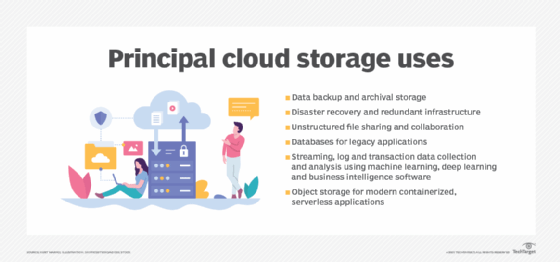
Alex - stock.adobe.com
How AI and cloud storage can work together
AI can help cloud storage providers with management, but challenges for users include vendor compatibility issues, lack of transparency in cost and privacy concerns.
AI is a transformative technology that helps organizations save time, reduce costs and improve operational efficiency. CIOs and other tech leaders might wonder how it can help with cloud storage, given the level of optimization already present in that domain.
AI expands how cloud storage providers handle storage, maintenance and forecasting. They use it to manage daily tasks and offer more efficient cloud storage. Capabilities for AI and cloud storage include intelligent data management and enhanced security, but users must consider challenges as well.
Cloud storage tasks AI can aid
AI most easily integrates into cloud storage for monitoring, diagnostics and predictive analysis in storage infrastructure and applications. AI can help with the following tasks in a cloud storage environment:
- Automated management and configuration. AI can automatically determine cloud performance, resource consumption and capacity needs. It optimizes workload placement for improved resource use.
- Fault prevention. AI can predict and prevent system failures by analyzing large volumes of data, such as performance metrics and power usage. It uses this information to identify potential failures and bottlenecks and to automatically distribute workloads.
- Predictive resource and capacity planning. AI can alert providers when upgraded hardware or software is needed so that teams can proactively schedule the purchase and installation.
- Intelligent data management. AI and cloud storage can help classify data more appropriately for behavior-based management that's more relevant for the zettabytes of data organizations generate. It applies data policies and performs the necessary protection tasks to such high volumes.
- Enhanced data security. AI can close security gaps faster by analyzing network traffic patterns, user behaviors and access logs in real time to identify potential anomalies and breaches. AI-powered encryption techniques add an extra layer of protection so that data remains secure through its lifecycle.
Best practices for using AI and cloud storage
Most cloud storage vendors use AI in their platforms, so customers should first understand how it is used before signing up. Look at the telemetry of the platform and how it connects to alerting and monitoring tools.
Next, see if the AI tools have or need access to user data on the hardware and software in order to work. For example, is the tool simply monitoring server performance and bandwidth levels, or is it unnecessarily digging into the data to glean insights? Make sure the AI does not cause any privacy violations.
Check how well the cloud vendor's AI algorithms can understand and use the information gathered. The AI tools should look beyond activity logs and use strong sets of APIs to gather information from as many sources as possible.
Finally, explore dynamic and flexible pricing options that support customer business requirements without surprises. For most, that's a pay-for-use subscription model that includes service-level agreements and guarantees that meet customer expectations.

Challenges to using AI with cloud storage
Sometimes AI and cloud storage don't work together across multiple vendor platforms or products. For example, if the cloud provider uses SAN devices from one vendor, an AI storage management system from another vendor might not be compatible. Storage providers should verify that their AI tools work with all their hardware and software before offering it to customers.
Equipment-related costs are often obscured for customers because of the nature of cloud storage. As a result, ask for price increase details when they happen. Vendors might embed tech refresh costs in subscription price increases without much transparency.
Not all organizations can allow third parties to connect to their data stores, even if the third party doesn't read or use the data. Cloud storage providers can use AI analytics software on local servers so that the telemetry collection meets more stringent data requirements. Doing so means they lose some benefit of the analytics when their usage data is not compared with the rest of the cloud storage environment.
For customers in heavily regulated industries such as healthcare and financial services, ask cloud storage vendors about their data collection policies. Ask how much information they collect outside of storage, and how they guarantee it remains anonymous and protected.
Julia Borgini is a freelance technical copywriter and content marketing strategist who helps B2B technology companies publish valuable content.







